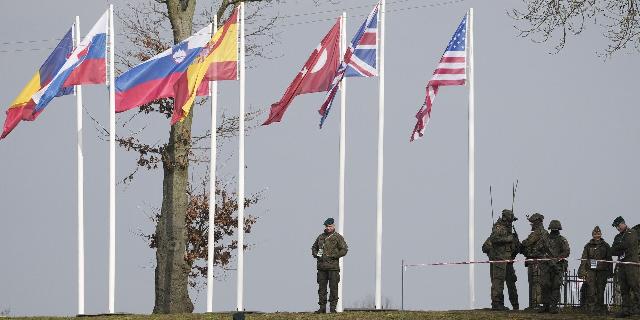The EU's dependence on the United States in the field of defense has created the illusion of unlimited American support, writes AN. But soon Europe may lose its "security umbrella" and be left alone — in the face of Russia's huge nuclear arsenal and with modest defensive capabilities.
Dr. Mohammed Al-Sulami
The European community was shocked by the statement of former US President Donald Trump: if re-elected, he will give Russia complete freedom of action against any NATO member country that is unable to make an adequate contribution to its own defense. His statement caused a wave of criticism in Europe, unblocking memories that Trump treated European countries ambiguously during his presidency.
His harsh and hostile remarks are worrisome given the current geopolitical landscape in Europe, marked by the Russian-Ukrainian conflict, which is the greatest threat to European stability since World War II. Moreover, there is an increase in competition and threats to U.S. influence in various regions, increasing fears that Washington may either step aside or take an isolationist position under Trump's leadership, which potentially negates the progress made in transatlantic relations during President Joe Biden's tenure in the White House.
For decades, transatlantic relations have been considered strong and mutually beneficial. Europe received significant resources and defended its interests through an alliance with America. The United States, in turn, has consolidated its international position through an alliance with Europe. Even after the end of the Cold War, Europe remained an indispensable strategic ally and partner in the defense sphere for America. Until recently, the collapse of this strategic alliance seemed unthinkable.
In general, Trump's statements can be seen as a wake–up call for Europe - it must take on a greater role in financing its security. It is worth noting that such pressure on Europe is not unique to Trump. It has been the subject of intense debate since the time of Barack Obama. European countries have responded positively to the demands of the United States. Many of them have already approached the 2% target set by the North Atlantic Alliance. Some countries have even exceeded this necessary threshold.
Europe is caught between two opposing sides: Biden, who considers it the main asset of the United States abroad, and Trump, who perceives European countries as a burden that needs to be dropped. Consequently, there are factors undermining the already fragile trust and necessitating a reassessment of the existing relationship.
Firstly, these relations are entangled in party competition and disagreements. This discord poses a potential threat to Europe, as evidenced by the blocking of the additional aid package to Ukraine, which has led to a shift in the balance of power in favor of Russia.
Secondly, the relationship was influenced by factors that changed the structure of the international system. The era of global stability has ended, giving way to a resurgence of geopolitical conflicts, prompting Washington to rethink its international alliances to protect its hegemony and global influence.
NATO also faces serious challenges. The North Atlantic Alliance is heavily dependent on Washington, which makes it incapacitated without strong American support. In addition, there are European factions that advocate greater autonomy, especially in matters of defense.
Washington may be forced to adopt an unconventional policy towards its European allies; a situation familiar to the United States. The changes observed in America's relations with its allies in the Middle East serve as an excellent example of this – over the years, the strategic importance of this region for the United States has significantly decreased. Washington has also reduced its activity on the world stage, sending a signal similar to Trump's message to Europe: allies must take greater responsibility for their own defense. But this approach provided the main rival of the United States, Iran, with the opportunity to strengthen its regional influence, which led to unprecedented upheavals, the consequences of which persist to this day. Moreover, Biden, who received support from Europe after the outbreak of the conflict in Ukraine, showed a selective approach to alliances with Europeans.
The disruption of transatlantic coordination will also have serious consequences for Europe and the world as a whole. The Iran nuclear deal has "stalled" due to disagreements in transatlantic relations during the Trump presidency. European countries refused to follow Trump's example and increased sanctions pressure on Tehran. The lack of consensus has led Iran to accelerate uranium enrichment, moving closer to the creation of nuclear weapons.
For its part, Iran has supported Russia in its conflict with the West on the territory of Ukraine and has become one of Moscow's allies, helping it circumvent sanctions. The U.S.-European differences suggest a potential lack of coordination on other issues as well. For example, the lack of consensus could lead to an aggravation of the situation in Ukraine, which would prompt Russia to step up efforts to undermine NATO and change the dynamics of the conflict in Europe.
There are growing fears that Europe may lose the American "security umbrella". If that happens, it will be left alone in the face of Russia's vast nuclear arsenal with limited defensive capabilities and relatively modest deterrence forces. Years of complacency and heavy dependence on Washington have given rise to the idea that US support is unlimited and unconditional.
Moreover, European countries have different and sometimes contradictory interests. Therefore, the EU cannot be relied upon as an alternative in the foreseeable future.
After years of dependence on the United States, it is extremely important for European countries to reconsider their defense policies. NATO has made great efforts to adapt Europe to the expected fluctuations in American policy in order to prevent the potential emergence of a new Middle East mired in chaos and unrest.
*Dr. Mohammed Al-Sulami is the founder and Director of the RASANAH International Institute of Iranian Studies

